#The hobbit analysis
Explore tagged Tumblr posts
Text
Bard totally thought Bilbo and Thorin were married
I’m back on my bs
So I remembered yesterday that the dwarves like totally lied straight to Bard’s face when they first met him, saying that they were going across the lake cause they were visiting their relatives in the iron hills. Now who knows how much of that he believed, but ya know, he didn’t ask many questions at least
So sure, cool. Couple of dwarves traveling between the blue mountains and the iron hills, nothing strange about that, they’re dwarves. But amongst the bearded little dudes, there’s a Hobbit. Hobbits, who famously rarely travel anywhere, much less as far as the iron hills. What is he doing so far from home?
But since none of the dwarves said anything akin to “Also this hobbit is traveling with us, just for convenience”, then it must mean that the hobbit is with them. Apart of the group, apart of the family. And unless one of these dwarves have adopted the little dude, which would be highly unlikely, he must be apart of the family in some other way. And what’a the most common way to enter a family? Marriage.
So the Hobbit, Bilbo as he introduces himself as, is probably married to one of the dwarves. But who? Well, he’s seen standing very close to the brooding one with dark hair and short beard. The brooding dwarf in fact rarely leaves his side, always standing on the ready to protect the little one.
And in the town square, when the brooding one (Thorin, rightful king of Erebor) needs someone to vouch for him, who is the first to pipe up but the hobbit, speaking highly of the young king, with adoration and hope in his eyes.
But not only did Bard probably think the two were married, no he also probably thought he was witnessing their divorce first hand on top of the wall of Erebor. Probably one of the weirdest couples he’s ever met, and his town had the unibrow guy hooking up with Stephen Fry.
#lotr#lord of the rings#the hobbit#bard the bowman#The hobbit analysis#the hobbit desolation of smaug#thorin oakenshield#bilbo baggins#Thilbo#bagginshield
3K notes
·
View notes
Note
I keep rewatching the Desolation of Smaug and have to ask… when Gandalf finds Thráin and they talk about Thorin, am I the only one upset that Thráin does not only not mention Dís, but neither does he talk about Frerin, who (how I understand the timeline) he believes is alive as well?
YESSSS! That’s a gripe I have about the movies for sure- they completely erased Thorin’s family. It was convenient for his portrayal and their ease to pretend like it was just him despite that A canonically not being true and B removing the potential to have a good female character not to mention a female dwarf! Even a flashback with Dis would have been so cool and female representation in the hobbit would have been neat! Like…use the canon lady instead of making up a bullshit love triangle pawn lmaos (no hate to Evangeline, she didn’t want that either and did great with what she had to do). I’m a Dis truther. A Dis kisser dare I say. If Dis has no fans I’m dead 😤⚔️
29 notes
·
View notes
Text
This analysis is amazing and I’m LIVING for it! Never have I read this much up on it other than wondering about some of these things. I agree, I love our boy jirt bUT killing the whole line always felt to me a little…counterintuitive to the whole original goal of the story? Like obviously Erebor is reclaimed and showing war and rule as bittersweet things is great, maybe this is Thorin’s literal life’s work, but part of it was restoring the glory of his family line and gaining their honor. Dís is barely mentioned and Fili and Kili get a very brief throwaway death and that kills me 😫
Mary Sue Dain 💀😂 again, odd choice to go on about how this character is sooooo much better than your og main character, like weird flex??? The Hobbit is an amazing story for sure, but the sudden shift always threw me and I think this explains it. It was like he said don’t look at those guys you’ve been paying attention to *Will Smith meme* look at this one! And the princes just deserved a better death than ‘oh yeah they fell in battle too’ to ensure a character we don’t care about as much gets to reign… odd narrative choice/payoff for readers’ investment imo!
I won’t get too started about the patriarchal dwarves thing 😂 but we all know how much they respect the rare jewels that are dwarf women even if the lines happen to go through male relatives/names! That feels like such a copout but I digress. Thank you OP and just both accounts for having this conversation and doing a bunch of research on things to articulate things way better than a lot of us could have 😁
Just reread The Hobbit 😩 and I stand by my opinion:
📣 Bilbo would have stayed in Erebor if Thorin didn’t die 📣
#the hobbit#the hobbit analysis#analysis#thorin oakenshield#dain ironfoot#fili#kili#I really appreciate this post everyone go thank our tolkien scholars on tumblr!
742 notes
·
View notes
Text





I wonder what small things could have changed their story. For instance what if Thorin didn't die, would Bilbo stay in the mountains, would he visit, would he not visit, or would Thorin visit Bilbo? Or what if the story would have been written by another writer or in another time period would their relationship dynamic still be up to interpretation or would it be explicitly platonic or romantic?
#bagginshield#bilbo baggins#lotr#the hobbit#tolkien#thilbo#hobbiton#tolkien dwarves#tolkein#maybe in another life#what if#analysis#professional yapper#rant post#for your priiiiiide#booklr#children's books#books and reading
150 notes
·
View notes
Text
No because I can't stop thinking about the exchange when Thorin had dragon sickness and Bilbo was facing him on top of the mountain. Especially when he said "the dwarf I met in Bag-end would never have gone back to his word. Would never have doubted the loyalty of his kin!"
The thing is he is talking about that Thorin, not the one in the top of the Carrock when he finally accepted him or stopped being so reserved or any version of him later. Not the Thorin he was able to reach, know and love. He is refering to the same dwarf that told him he didn't belong, that he ran away in the tunels and that he was lost. He meant the one who was mean to him.
And I think that even then, Bilbo saw the beauty within him. He saw something in him that made him stay and, with time, he was able to touch his soul in a way no one did. And Thorin knew this, that's why he was so heart-broken on that scene.
#I can and WILL do a full analysis on this#bagginshield#thorin x bilbo#bilbo#the hobbit#thorin#thilbo#lotr
552 notes
·
View notes
Text
I just re-read some pages of The Fellowship Of The Ring and I don't get why so many people take issue with around-20-y/o Elijah Wood being cast. While Frodo Baggins is indeed canonically about 50 years old, the book specifically mentions how he looks like someone fresh out of his teens because he kept the One Ring for multiple years, which is known to keep their owner young and fresh (at least at the beginning until they rapidly age after getting rid of it) - not to mention that since hobbits age slower than humans, Frodo would only be in maybe his 30s. On one page we are being told that multiple people gossip and wonder about how young he still looks, including Gandalf. So if anything, you could say that Elijah Wood was too skinny or too attractive (though I do think he looks like Frodo is described), but not too young.
And I actually like that he looks young because it not only does it make him look cute and innocent, but we also get the notion of someone who has had a relatively quiet and happy, sheltered life before (aside from the terrible death of his parents) and of someone who is visibly sensitive and innocent and gets taken care of a lot. The BIGGEST reason I like his young looks however, is the parallel to young soldiers who are ripped out of their homes by outer forces, by older men who are the ones who started the wars. Young soldiers whose lives are practically destroyed before they even really begin, just like Frodo's - even if he's already half a century old. He comes back traumatized and sick/disabled having saved the world but having lost so much. Most likely his innocence too.
#i initially wanted to add photos of the pages as proof#but I only have the German copy and most of my followers would only know English#so you just have to take my word for it or re read it yourself lol#lotr#the lord of the rings#lotr fellowship#the fellowship of the ring#fantasy#books#my thoughts#book characters#frodo baggins#elijah wood#2000s movies#hobbits#tolkien#thank you for coming to my ted talk#rambling#favorite character#somewhat an analysis#my opinion
238 notes
·
View notes
Text
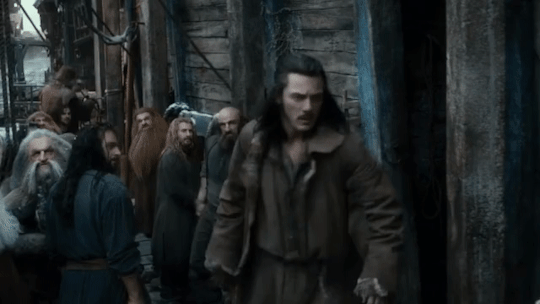
I like to just stare at this 3-second long scene because it speaks volumes. Here it is again slowed down and zoomed in.

Thorin immediately moves to Bilbo. Nori looks back not just for confirmation but also because it looks like Thoirn might step in front of Bilbo but he doesn't. Bilbo and Thorin lock eyes you can see it in how Bilbo's eyes are glued to Thorin's face. Look at Nori very carefully because he does a little double-take at the look Thorin is giving Bilbo. Instead, Thorin assumes a defensive position behind Bilbo after nodding for him to continue.

Now take the above scene. Bilbo looks bewildered and completely out of his element. Why wouldn't he? He's never seen a town built for men. They are about to head into a more open area. Thorin hates areas like this look at the disdain on his face. He moves around Bilbo bracketing him into the middle of the company so he is in the safest possible spot.
#bagginshield#thilbo#the hobbit#bilbo x thorin#character analysis#bilbo baggins#thorin oakenshield#deep dive
2K notes
·
View notes
Text
As Tolkien often observed; “names often generate a story” and always nearly contributed or suggested something of the nature or personality of the character, thing or place that has been named. Yet the most intriguing name he has created in my opinion, is the main protagonist of “The Hobbit” Bilbo Baggins who is the hero of the classic tale, and despite being seen as such, his name holds interesting and contradicting connotations. For Baggins suggests harmless, humble and well- contented characters (though with criminal undertones!) Yet the name Bilbo suggests an individual who is sharp, intelligent and even dangerous….
The family name of Bilbo is “Baggins” which derives from a double source-the English Somerset surname Bagg, which means “moneybag” or “wealthy.” The term “Baggins" itself means “afternoon tea or snack between meals” and at first is appropriate in describing our well off hobbit. Initially he is presented as a mildly comic, home-loving, upper middle class “gentle hobbit” who seems harmless and composed enough, if given to some annoyance. He is mostly concerned with his mothers dishes, doilies, domestic comforts and food. However, once recruited by Thorin and his Company, we see the respectable gentle hobbit reveal his true colours- he is an excellent and highly skilled burglar.
Tolkien has maintained that his tales are often inspired by names and words from the real world, and indeed, in the jargon of the nineteenth-and early twentieth century criminal underworld there were a cluster of names around the term “bag” and forms of theft. “To bag” means to capture, to acquire, or to steal. “A baggage man” is an outlaw who carries off the loot and a “bagman” is the man who collects and distributes gold on the behalf of others by dishonest means or purposes.
His surname not only characterises himself, but also plots out the narrative for the story. For in the hobbit we discover Baggins is hired by Dwarves to bag the Arkenstone. He then becomes the baggage man who carries off the loot. When he realises Thorin has fallen under the gold sickness, he becomes the bagman and is dishonest to the newly crowned king, distributing the Arkenstone to Thrandruil and Bard. After the Battle Of The Five Armies he hands out the treasure to those who are rightfully in need of it, and thus ends him being the bagman.
Another aspect of Bilbo Baggins character can be revealed by the analysis of his first name. The word “Bilbo” entered the English language in the late sixteenth century as a name for a short and deadly piercing sword of the kind once made in the Spanish port city of Bilbao where the name derives from. This is an excellent description of Bilbo's elvish sword (often called a letter opener) named “Sting.” Found in the troll hoard, Bilbo's “bilbo” can pierce through any animal hide that would break any other sword. In The Hobbit however, it is the hero's sharp wit rather than his sword that gives Bilbo his sharpness. Bilbo's well-honed wits allow him to survive the journey and to trick monsters, a dragon and to get himself out of bad situations.
When we put these two names together as Bilbo Baggins, we fully understand the two aspects of his character, showing someone who is dangerously witty, but ultimately good and humble to a fault. If we want to dig deeper into how these names also affected the events of the Lord Of The Rings, one has to look no further than Frodo Baggins.
Along with the Baggins family name, further “baggage” is passed on to Bilbo's nephew and heir, Frodo Baggins who in the context of the one ring is a link to another underworld occupation; the bagger or the bag thief. This bagger or bag thief has nothing to do with baggage, but is derived from the French word bauge, meaning “ring.” A bagger then, is a thief who specialises in stealing rings by seizing a victim's hand and stripping off its rings. It had common usage in Britain's criminal underworld between 1890 to 1940. The Baggins name holds the idea and plot for both The Hobbit and Lord Of The Rings. For Bilbo's skill as a burglar, one might say that in the perspective of outsiders, the Baggins baggers of Bag End, Bilbo and Frodo, are naturally born ring thieves.
#tolkien#bilbo baggins#frodo baggins#bilbo#frodo#lotr meta#meta#analysis#linguistics#the hobbit#hobbit#hobbits#i spent way to long researching this#lotr#silm
1K notes
·
View notes
Note
How would Thorin comfort his lover? Both when it’s related to physical pain/injury and emotional distress
Please and thank you! 🩵🩵
Thorin, in my mind, shows his love through touch. Comforting his lover would mean touching her gently, whether her hand, arm, face, or maybe something a little more intimate, like a leg, when no one is looking.
Obviously physical injury may be a little more difficult, but Thorin would tend to her wounds himself, not wanting touch from anyone else. I imagine him being a little jealous in that respect. Not overly, but something he can’t help himself feel.
Apart from touch, he is a gift giver. He’d shower her with flowers, trinkets and even food. Then he’d encourage her to rest, not take on extra duties, and remain beside her. ♥️
Thank you for asking, love! Thoroughly enjoyed answering this.
#thorin oakenshield#the hobbit#character analysis#ask#mismaeve#comfort#headcanon#thorin x fem!reader#thorin x oc
47 notes
·
View notes
Text





MAIRON THE ADMIRABLE
#Mairon#Sauron#LOTR#Lord of the Rings#The Lord of the Rings#TROP#The Rings of Power#Rings of Power#mine#my edit#Smeagol#Gollum#Annatar#Charlie Vickers#Galadriel#Cate Blanchett#Saurondriel#Haladriel#JRR Tolkien#Tolkien#One Ring to rule them all#Hobbit hatred#Unseen world#ROTK#Return of the King#Fellowship of the Ring#Ring analysis
44 notes
·
View notes
Text
about hobbits
Tolkien didn't make Frodo the protagonist to win the battle against Sauron. Frodo did not cast the ring into Mount Doom, he lost the fight against Morgorth's forces, and Gollum who was so taken by the darkness instead danced to death and by his last steps wrecked it.
Just as how LotR is but a sail in the sea of Eä's saga, Frodo is but one in the grand scheme of the Third Age, yet someone he is indeed, to be chosen as our protagonist of the overarching myth.
Because Tolkien is not celebrating victory. Or rather Victory Frodo did, along with the Fellowship of the Ring, in lauds of honour and chivalry and mighty strength he won it fair and square, in Tolkien's words a soldier unable to give the final blow had not succumbed to foe, for amid the injuries that broke body and mind he went far as he could, by virtue of his tenacious yet humanly will.
But to conquer he didn't, be it out of our author's christianly beliefs or the sighted ravages of war. There are scars in the heart that never can heal, and there are battles on earth too terrible to win that one, when they are over, feels no bliss but the mighty weight of self-recrimination and a cognisance of growth which sees the world through lenses perpetually changed.
Frodo is our protagonist, meekly resilient, humbly noble, yet mortally inadequate, and weak, and loving. He ends but a brief shadow cast in the annals of history, life changed but wounds never closed, darkness touched yet the light of Galadriel ever abiding.
The fellowship is beautiful and they all are, and Tolkien wrote about Hobbits of course because they are loveable, but loveable because they are unassuming, and inadequate, and humanly. In the face of heinous turmoil they see their valiant nobility, and in the depths of darkness hope prevails, fellowship endures.
The fellowship doesn't win. The hobbits weren't ever intended to win. Darkness exists. But like Frodo he stood tall, he loved, and Samwise stepped in, and that was enough.
i know tolkien disabuses the notion of any allegory but there are things and let it be.
okay sorry i initially wrote this under the reblog but my comprehension skills were too poor and i was embarrassingly off topic so i better make my own post.
#lotr#lord of the rings#hobbits#frodo baggins#tolkien#sam gamgee#fate's analysis#fate creates#and by his last steps wrecked it because the rhythm and meter how could i not#one ring to bring them all and in the darkness bind them
26 notes
·
View notes
Text
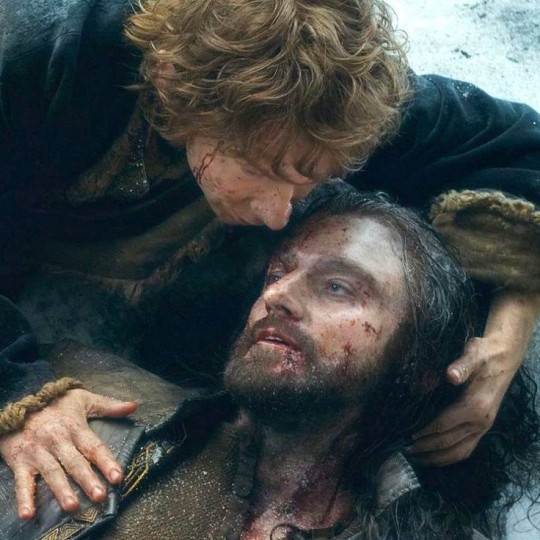
Thorin Oakenshield can be considered a tragic character.
Analyzing Thorin Oakenshield as a tragic character through the lens of Greek tragedy provides a deeper understanding of his narrative arc and character development. Here’s a detailed analysis based on the principles of Greek tragedy:
Characteristics of Greek Tragedy
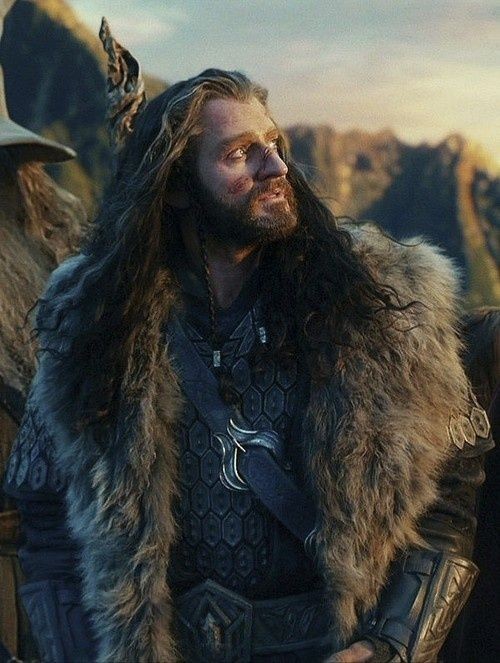
Noble Stature:
Greek tragedies typically feature protagonists of noble birth or high status.
Thorin's Noble Stature: Thorin is the rightful heir to the throne of Erebor, which establishes his noble lineage and royal status.
Hamartia (Tragic Flaw):
A tragic hero possesses a flaw or makes a mistake that leads to their downfall.
Thorin's Hamartia: Thorin's tragic flaw is his overwhelming greed and obsession with reclaiming the treasure of Erebor, particularly the Arkenstone. This greed blinds him to reason and leads to irrational decisions and conflicts.
Hubris (Excessive Pride):
Many Greek tragic heroes exhibit hubris, an excessive pride that often leads to their downfall.
Thorin's Hubris: Thorin's pride in his lineage and destiny to reclaim Erebor contributes to his downfall. His refusal to share the treasure and his stubbornness in negotiations with other parties reflect this hubris.
Peripeteia (Reversal of Fortune):
The hero's fortunes change dramatically, usually from good to bad.
Thorin's Peripeteia: Thorin's initial success in reclaiming Erebor turns sour as his greed alienates allies, causes internal strife, and leads to the siege of the Lonely Mountain. His fall from a respected leader to a paranoid and isolated figure marks this reversal.
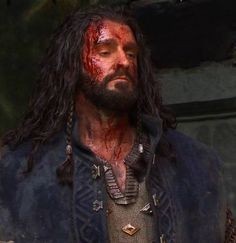
Anagnorisis (Recognition):
The hero realizes their flaw or the true nature of their situation, often too late to avoid the consequences.
Thorin's Anagnorisis: Thorin experiences a moment of clarity on his deathbed, recognizing the destructive power of his greed and seeking reconciliation with Bilbo and others he wronged.
Catharsis:
The audience experiences a purging of emotions, particularly pity and fear, through the hero’s journey.
Catharsis in Thorin's Story: Thorin's tragic arc elicits pity for his internal struggle and ultimate downfall, and fear of the destructive nature of unchecked greed and pride. His redemption at the end provides a bittersweet closure.
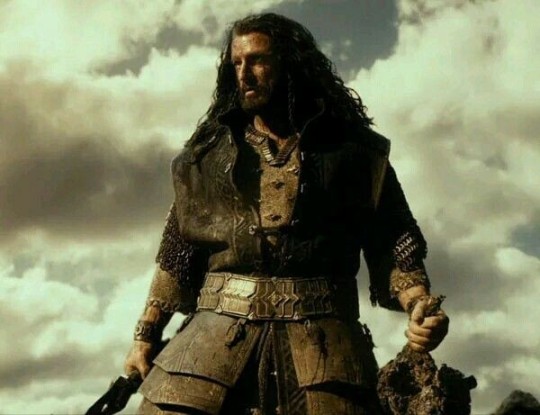
#the hobbit#thorin#richard armitage#thorin oakenshield#character analysis#tragedy#greek drama#from a scenographer's view and a drama theory#i love analyzing characters and reveal their theatrical features#Thorin is a tragic character#i would see him in as a role in greek tragedy by Aeschylus or Euripides
54 notes
·
View notes
Text
USE SPECIES ANALYSIS ON TOM RAWLING - THE ZERG
GOLLUM FROM THE HOBBIT MOVIES BASED UPON BOOKS BY J.R.R. TOLKIEN
#j.r.r. tolkien#the hobbit#frodo baggins#gollum#the zerg#cave + lake with lake trout + ireland#tom rawling#offensive to have his descendants or ancestors or associates walk on this planet#tom rawling + fafe time#fafe time#species analysis#zerg#mice#cockroaches#original timeline#pi day#martin luther king jr#fashoing#michelle obama#starcraft#the lord of the rings#vigo mortensen#elijah wood#taylor swift#liv tyler#animals masked as sentient beings#imposter species#predator species#cannibalism
83 notes
·
View notes
Text
you know when you think about it
Hobbit/LOTR is basically Tolkien's Fantasy AU Fix-it for WWI.
Sometimes I think of him serving in the trenches and foxholes of the Somme and then later inventing a different kind of shelter under the earth: one that is warm and bright and full of comfort, with a full larder and a cheery fire and a little green door.
One of the things that I very much love about humans is the way that we can take the things that hurt us and look for ways to transform them into something that can bolster us, even if they are only ideas. Even if they are only stories.
In a hole in the ground there lived a hobbit.
181 notes
·
View notes
Text




I'm still unsure if it hurts more that we didn't get to see their final moments in the book. I can see two takes on this one. 1. It takes away from the story and the emotional impact of their deaths by simply telling and not showing and 2. It actually hurts more because we don't get to properly see them go/say goodbye to these characters. I'm leaning more towards 2. I think it also hurts more that they died protecting Thorin. Idk just a random thought.
#fili and kili#fili durin#analysis#kili durin#thorin oakenshield#the hobbit#book#tolkien dwarves#tolkien#lotr#rant post
60 notes
·
View notes
Text
It’s Analysis Friday, Middle Earth Music Edition!

If you’re up-to-date on adaptions of Tolkien’s work, there is not an adaptation that goes without presenting a song or 10. The scholar, writer, and linguist loved music! But he didn’t include songs for the sake of it. Tolkien loved songs so much that he made music carry themes, story, and his world itself.

At the start of the Silmarillion, it reads like the Bible’s creation account. Eru Iluvatar sang the Ainur(gods and spirits), Eä(universe), and Arda (earth) into existence. Likewise, Melkor disrupts the song with his own strange one, corrupting other Ainur and introducing darkness to the world.
Words carry great power in Arda, and songs are often powerful prayers. Many of Sauron’s schemes hinge on manipulating others’ desires and insecurities. Finrod defeated Sauron through song. And Disa’s failed attempt to get the mountains to bring back the sunlight was very poignant to me last week because of the relevance song has in Middle Earth.

Tolkien’s Songs on the Screen
Hobbit (Rankin-Bass) - 7
Lord of the Rings (Bakshi) - 1
Return of the King (Rankin-Bass) - 3
Lord of the Rings (Jackson) - 6, 2, 2
Hobbit (Jackson) - 2, 0, 0
Rings of Power (up to S2E4) - 5?

For more Tolkien music:
BBC Radio Dramatization of LotR
LotR Musical (apparently quite bad (jk, it’s officially on my to-watch list now thanks to the comments!) mixes Tolkien’s songs with original ones)
Andy Serkis’ LotR audiobook readings
Clamavi de Profundis - family music group that adapts fantasy songs, lots of Tolkien!

For a universe that doesn’t act as a musical, there’s rich lore hidden inside its music!
#analysis fridays#analysis#media analysis#lord of the rings#the hobbit#the silmarillion#middle earth#jrr tolkien#lifelong tolkien fan#music#folk songs#Tolkien’s songs slap#middle earth lore#ainur#valar#maiar#elves#hobbits#men#dwarfs#did I mention that mining is practically a religion to the dwarfs?
28 notes
·
View notes